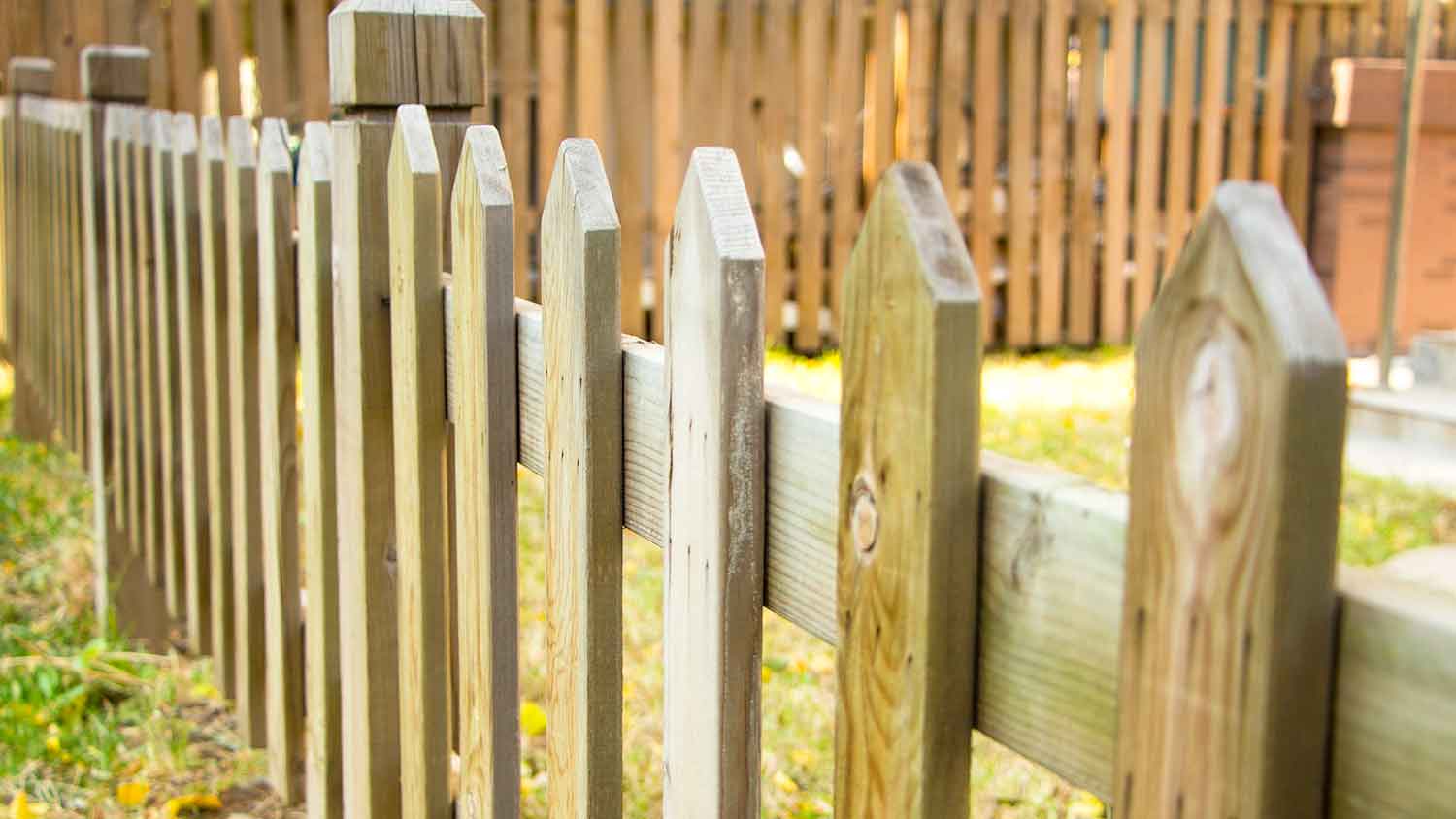
Renting temporary fencing will protect your property during construction or even a party. Fence type, material, and security features impact the cost.
Nail down this detail for a secure fence


Choose 2-inch (6d) 21-degree galvanized ring shank nails for fence pickets.
If you opt for thicker pickets (3/4-inch boards), use 2.5-inch nails (8d).
Use a framing nailer to install fence pickets.
Skimping on nails leads to rot and a weak structure.
Choosing the right nails for your fence pickets ensures the strength, stability, and longevity of your fence. In most cases, 2-inch, 21-degree galvanized ring shank nails are best for fence pickets, but it depends on the thickness of your pickets. Learn how to choose what size nails you need for fence pickets so you can get to work.
The most common nails used for fence pickets are 21-degree galvanized ring shank nails that are 2 inches long (6d nails). Here’s why:
The angled design allows you to access tight spaces, which is crucial during fence installation.
The 6d, 2-inch size provides the proper length and holding power for 5/8-inch standard fence pickets.
The 11-gauge thickness penetrates the picket easily without splitting the wood.
Galvanization prevents corrosion and rust, making these ideal for outdoor use.
Most homeowners choose 5/8-inch thick fence pickets since they provide ample strength and durability while still being budget-friendly (at least, as much as wood can be). Some homeowners opt for premium options, such as 3/4-inch- or 1-inch-thick pickets, for increased durability, especially in windy areas.
Here’s the best nail size to use for each thickness:
| Fence Picket Thickness | Best Nail Size |
|---|---|
| 5/8 inch | 21-degree galvanized ring shank nail (6d, 2 inches) |
| 3/4 inch | 21-degree galvanized ring shank nail (8d, 2.5 inches) |
| 1 inch | 21-degree galvanized ring shank nail (10d, 3 inches) |
Most homeowners choose this thickness for a strong yet cost-effective choice. Two-inch, 21-degree galvanized ring shank nails are the best.
A 3/4-inch picket is considered premium, with added durability and a smoother appearance. For this thickness, 2.5-inch, 21-degree galvanized ring shank nails are the best.
Thick boards are ideal for windy climates and tall fences. Three-inch, 21-degree galvanized ring shank nails are best.

The best way to measure the right size nails for fence pickets is to review the label on the box. You can also use a tape measure from the head of the nail to the tip. For most fence pickets, look for a 2-inch nail, ideally a galvanized ring shank nail that will withstand weather and provide maximum hold.
Ring shank nails have raised, helical ridges along the shank to distribute pressure evenly and reduce wood splitting. The galvanization holds up against years of exposure to weather and the elements, preventing rust.
Nails that are too short lead to a weak structure. Nails that are too long stick out. Nails that are too weak lack holding power and grip.
Use a framing nailer to secure fence pickets since they can handle the thicker galvanized nails, specifically 21-degree ring shank nails. If you’re installing a thinner, more decorative fence, you can use a siding nailer or a 16-gauge nailer. However, a framing nailer is ideal for thicker wood and large fences because it offers maximum strength and ease while inserting your nails.
An 18-gauge brad nailer does not provide enough strength and power to secure the main structure of a fence. Brads lack the holding power needed for heavy-duty outdoor use and the thicker woods of a fence. The small nail heads can also leave visible marks on the wooden picket.
The wrong size and type of nail can lead to warping, structural issues, and rotting—requiring you to replace or repair your fence sooner rather than later. It’s best to exchange your nails for 21-degree galvanized ring shank nails that are 2 inches long.
It’s worth the extra money and effort to choose the right size nails for your fence. If you’re unsure about your fence project or want a second opinion, contact a fencing pro near you. They can also provide quotes for your fence project, giving you the chance to see if you want to DIY.
From average costs to expert advice, get all the answers you need to get your job done.

Renting temporary fencing will protect your property during construction or even a party. Fence type, material, and security features impact the cost.

Shadowbox fencing can boost your home’s appearance and privacy. Use this guide to learn how much it costs to install a shadowbox fence based on factors like material, length, and height.

The cost of a barbed wire fence depends mainly on how large your property is. If you have a longer fence, you can expect to pay a few thousand dollars.

Whether you’re looking to replace your chain link fence or just want it gone, find out how to remove a chain link fence here.

Ready to restore privacy to your yard using a few tools and a little elbow grease? Here’s how to repair a chain link fence in eight simple steps.

Explore 5 common types of chain-link fences: galvanized, vinyl-coated, privacy, mini-mesh, and security. Find the perfect fit for your property needs.